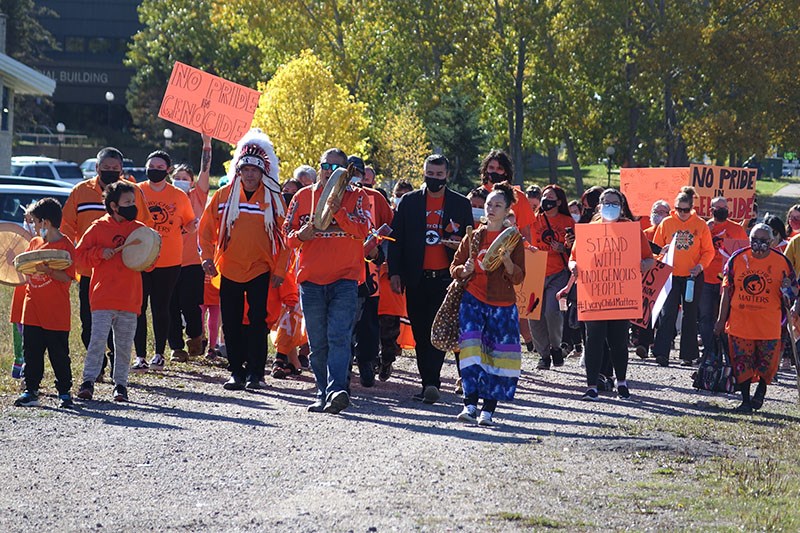Residential school survivors shared memories of their experiences and how the institutions affected their families at two events marking the first National Day for Truth and Reconciliation in Thompson Sept. 30.
Fred Stevens, who was taken away to residential school with his twin brother, said during a Keewatin Tribal Council (KTC) event at the Ma-Mow-We-Tak Friendship Centre, that he thought it was bad going to day school and getting strapped but that residential school was worse.
“It was very lonely,” he said, and students were subjected to mental and emotional abuse soon after they arrived and then other forms later. “It started getting physical and then there was sexual abuse.”
It also affected the relationship between himself and his father, who was sent to residential school in Prince Albert when he was a child. When Stevens was finished school and he would drink with his parents, his father finally began to express emotions to him, but only when he was drunk. Stevens wondered why he had never heard anything like this from his father growing up.
“I didn’t realize that he couldn’t because of his own residential school experience,” he said “They took that away from him.”
Another survivor, who asked that her name not be used, attended a residential school in Sturgeon Landing and said students would have tape put over their mouths if they talked in their Indigenous languages and that the atmosphere was devoid of affection.
“We were lonely because we could do nothing,” she said.”Even if you cry they’re not going to hug you, they’re not going to say ‘I love you,’ they’re just going to put you in a corner and let you cry until you’re finished.”
The school was later destroyed by a fire.
“Everybody was so happy when the school burned down,” she said.
At a service held by Manitoba Keewatinowi Okimakanak (MKO), Nelson McKay of Cross Lake, who went to residential school in Dauphin, and whose parents were also survivors, said he has tried to be open about his emotions with his children because he never heard that from his father.
“Two people came out of residential schools – the silent ones, that was my dad, and the aggressive ones that went to alcohol and drugs. That’s the way they cope, to quiet the pain that they’re hiding. That weight inside you gets too heavy, it’ll drag you down also.”
Though the first National Day for Truth and Reconciliation is a day for looking back and acknowledging the injustice of the residential school system and the abuses that occurred there, that is only one part of truth and reconciliation, said Churchill-Keewatinook NDP MP Niki Ashton. ‘
“Today, yes, is about remembrance but ultimately it is about action,” she said. “There is an ongoing, not just past but ongoing, genocide against Indigenous Peoples and that that genocide must stop. The crisis that is the child welfare system must stop. The poverty that exists must stop. We have ways of doing that and that starts by living the idea that every child matters. There is no reconciliation without truth and without concrete action.”
Seeing people dressed in orange, including non-Indigenous people, to mark Sept. 30 is a hopeful sign for the future, said MKO Grand Chief Garrison Settee.
“They come and hear our stories. This is the beginning of reconciliation.”
Manitoba Indigenous Reconciliation and Northern Relations Minister Alan Lagimodiere told attendees at the KTC ceremony that the province is committed to respectful, meaningful and impactful actions to right the wrongs and reverse the negative fallout of the residential school system.
“The harms of residential schools can not be undone and we all must learn from them,” said the minister. “The Manitoba government will continue to contribute to this effort in every way we can guided by the calls to action and by listening to individuals communities and to leadership.”
To commemorate the first truth and reconciliation day, flags listing the name of every child known to have died at residential school were erected by MKO at Thompson’s monument to residential school victims and survivors in Lions Park.




